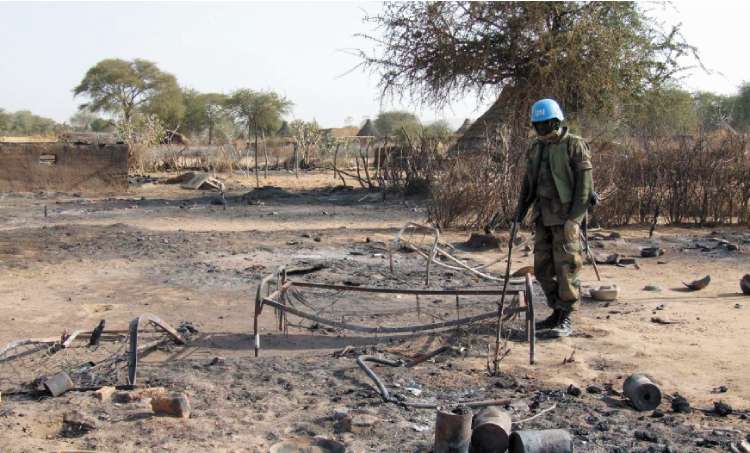Sudan ousts British officer from Darfur peace mission

Your support helps us to tell the story
From reproductive rights to climate change to Big Tech, The Independent is on the ground when the story is developing. Whether it's investigating the financials of Elon Musk's pro-Trump PAC or producing our latest documentary, 'The A Word', which shines a light on the American women fighting for reproductive rights, we know how important it is to parse out the facts from the messaging.
At such a critical moment in US history, we need reporters on the ground. Your donation allows us to keep sending journalists to speak to both sides of the story.
The Independent is trusted by Americans across the entire political spectrum. And unlike many other quality news outlets, we choose not to lock Americans out of our reporting and analysis with paywalls. We believe quality journalism should be available to everyone, paid for by those who can afford it.
Your support makes all the difference.The struggling United Nations mission in Darfur has suffered a fresh blow after its British chief of staff was forced out by the Sudanese government. Brigadier Patrick Davidson-Houston, the most senior non-African official in the joint UN and African Union mission, said he was "extremely disappointed" to be leaving Darfur just six months into his one-year contract.
"The Government of Sudan has objected for some time to the presence of a British general in Darfur," the brigadier said in Khartoum, the day before he left. "They have requested that my appointment should be reconsidered, if I can put it kindly."
His departure comes at a critical time for the UN's most high-profile mission. Some five months after Unamid took over from its ailing AU predecessor, critics say little has changed. The force is supposed to have 26,000 military personnel and police officers. It has just 9,000, the same number the AU force had in December. It is also supposed to have 18 support helicopters to move troops around a country the size of France as well as six armed attack helicopters. It has none.
The peacekeepers are increasingly finding themselves under attack. An unarmed Ugandan police officer this week became the first Unamid peacekeeper to be killed; he was shot dead near a market in El Fasher, the capital of north Darfur. A group of Nigerian peacekeepers was last week ambushed by up to 60 armed men on horseback in west Darfur who took their weapons and vehicle.
Although some in the west have been critical of Unamid, Brigadier Davidson-Houston said the international community was expecting too much, too fast. "When the international community says, 'You have to build it up faster' they have to understand that the logistics are very, very challenging," he said.
One major problem has been acquiring enough land to build bases. "There is nowhere you can stand in Darfur and someone doesn't own it. Once you have the land you need to find water. It is impossible to deploy anyone until you have these things in place."
Brigadier Davidson-Houston arrived in Sudan in November 2007, a month before the Unamid mission began. Alongside the widely admired force commander, Martin Luther Agwai, a Nigerian, and the deputy force commander, Emmanuel Karenzi, a Rwandan, Brigadier Davidson-Houston has been credited with "making the best of a bad job", as one senior UN official described it.
But while the brigadier was winning plaudits within the UN, he was making enemies inside the Government of Sudan. According to officials at Unamid, the first attempt to throw him out of the country was in January. Only the direct intervention of the UN Secretary General, Ban Ki Moon – who spoke to Sudan's president, Omar al-Bashir – ensured he stayed on for longer.
The matter did not end there. Over the following months, Brigadier Davidson-Houston's continued employment was brought up by a series of government officials who objected to his presence.
But a spokesman for the Sudanese government insisted that they had not tried to remove Brigadier Davidson-Houston. "This justification is not correct," said Dr Rabie Atti. "Unamid appointments are beyond the jurisdiction of the government."
Sudan's government agreed to the deployment of Unamid last year, but only if it was "of a predominantly African nature". Almost all troops have, so far, been provided by different African countries. Sudan has refused to accept any troop deployments from Thailand and Nepal, arguing that there are enough African countries prepared to send personnel.
Join our commenting forum
Join thought-provoking conversations, follow other Independent readers and see their replies
Comments